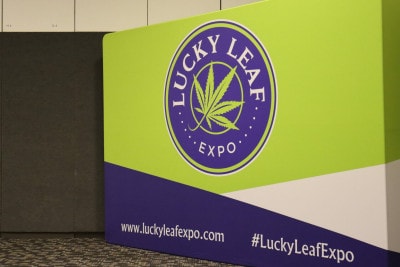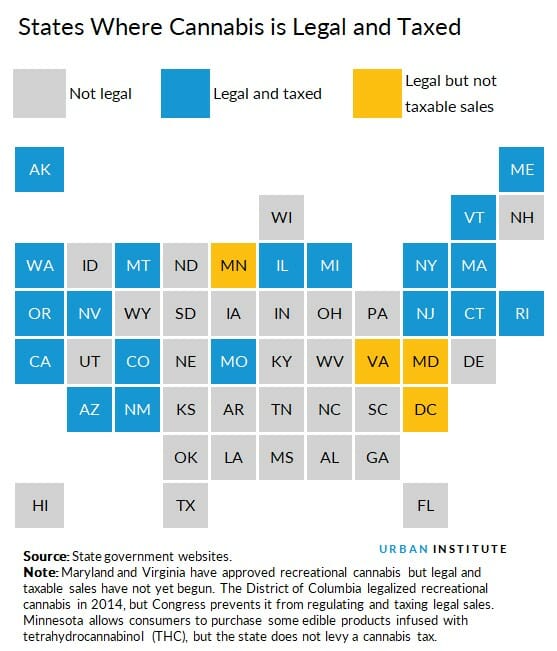Local Voters Ponder New Taxes on Marijuana Sales Balancing Costs and Benefits
Published March 30th, 2023 at 6:00 AM
Above image credit: Young cannabis plants on display at the Lucky Leaf Expo last week. (Cami Koons | Flatland)From a consumer standpoint, the cost of recreational marijuana in Missouri is a great deal.
One reason? Taxes levied in Missouri are lower than in many other states where adult-use cannabis is also legal.
Put simply, your money buys more cannabis in Missouri — at least for now.

That fact thrilled Alan Sheiner, an Illinois resident who attended the Lucky Leaf Cannabis Convention 2023 held March 24-25 at the Sheraton Kansas City Hotel at Crown Center.
“How much I paid here would have bought one thing in Chicago — and I bought a lot,” said Sheiner, an account executive with Dutchie, a convention sponsor.
Dutchie helps dispensaries with the technology to manage cashless point-of-sale transactions, insurance, compliance and other business needs.
Temptation of Taxation
So far, 39 states and the District of Columbia have legalized medical marijuana, and 21 states, plus DC, have legalized recreational usage for adults.
How those sales are taxed varies widely from state-to-state and city-to-city, making direct comparisons difficult.
But cannabis revenue is increasingly prized by government officials.
In Chicago, a 2020 report by Illinois Policy found that residents could pay as much as 40% in combined taxes, depending on the type of product and the amount of THC (Delta-9-tetrahydrocannabinol) it contains.
On the April 4 municipal ballot Kansas City voters will be asked to add an additional 3% tax onto sales within city limits.
If approved and in combination with other taxes, some customers will pay nearly 23% in marijuana sales taxes in Kansas City. (Additional local taxes would apply only to recreational sales, not medical, which has a state tax of 4%.)
QUESTION 1: Shall the City of Kansas City impose an additional sales tax of three percent (3%) on the retail sale of adult use non-medicinal marijuana for the exclusive purpose of providing neighborhood quality of life improvements, to fund through the Department of Health, refuse and neighborhood cleanup services, homeless prevention services, and violence prevention services administered by the City?
The measure would add to the existing 10.85% local sales tax and the state’s 6% tax on marijuana sales, plus any county sales taxes on marijuana.
Voters in other cities around the metropolitan area will be asked to approve a 3% local tax on cannabis sales within their boundaries, including Belton, Grandview, Kearney, Liberty, Raymore, Raytown, Riverside and Smithville.
Jackson and Cass counties are also asking voters to approve an additional 3% tax on marijuana sales.
Expect these city and county questions to pass, as marijuana taxes rarely fail.
Even with voter approval, the rates here won’t be as high as in some other states, like neighboring Illinois.
Going Underground
Sheiner and other experts in the industry say one aspect about cannabis taxes has become clearer since California became the first state to legalize medical marijuana in 1996.
States and municipalities that load a high amount of taxes onto the sale of medicinal and or adult-use cannabis can inadvertently drive sales into underground or illicit markets.
“There’s really a lot of fear in the industry,” said Evan Hardebeck, a sales representative covering central Missouri for a cannabis distribution firm. “The higher you increase the taxes, the more chances of driving it to the black market.”

That outcome would grate against an overarching goal within the legal industry.
A big effort is being made to convince the general public about the positive aspects of legal cannabis. Those effects range from medicinal uses to addressing racial inequities in past drug enforcement and support of the societal benefits that tax revenues can fund.
As the 2020 article published by Illinois Policy, an advocacy organization, warned: “Springfield lawmakers have yet to learn the lesson that money walks. And it’s not just to other states. Sometimes, it walks past the legal dispensary with a 40% tax rate and into a dealer’s house.”
Legalized cannabis offers a tempting target for taxes.
Nationwide, legal sales of medicinal and adult-use marijuana are expected to reach $71 billion by 2030, according to New Frontier Data’s U.S. Cannabis Report 2023.
Eventually, taxes derived from legalized cannabis may begin to rival what governments can raise from alcohol sales, Sheiner said.
In fact, Massachusetts has already surpassed that threshold.
“Fiscal year 2021 was the first year that weed overtook booze, with the state collecting $92.7 million from alcohol and $112.4 million from the marijuana excise tax,” CBS News in Boston recently reported.
‘Sin Tax’ May Not Apply to Cannabis
An ongoing discussion is focused on how far taxes generated by legal sales will go toward increasing the acceptance of legalized marijuana by the public.
Marijuana usage is still illegal federally. It’s classified as a Schedule I Controlled Substance, a psychoactive drug and as the most commonly used illicit drug in the United States, according to a March 2023 report by the Congressional Research Service (CRS).
The Controlled Substances Act, which the U.S. Congress approved in 1970, doesn’t differentiate between medical and adult use of cannabis.
“Marijuana’s continued classification as a Schedule I controlled substance reflects a finding from the Drug Enforcement Administration (DEA) and Food and Drug Administration (FDA) that marijuana has a high potential for abuse and no currently accepted medical use in the United States,” said the CRS report.
And yet, the percentage of people over the age of 12 who report using cannabis in the past month gradually increased from 6.1% in 2008 to 13% in 2021, the report found, citing data from the National Survey on Drug Use and Health.
The 13% represented 36.4 million individuals.
The period studied aligns with when states were increasingly decriminalizing cannabis usage.
The fact that marijuana remains illegal under federal law creates barriers within the legal marijuana marketplace — and business opportunities for those who are finding ways around those obstacles.
For instance, sales at dispensaries are often managed as a cash transfer that occurs at the time of the purchase. Lending to people who need help with their startup costs can also be more complicated.
So-called “sin taxes” are traditionally layered onto items like alcohol and cigarette sales to counter the product’s negative impacts and discourage usage. Using such revenues for addiction treatment, or classes after someone is convicted of driving under the influence, are two examples.
Some municipalities are promoting the passage of their upcoming tax proposals on recreational sales of cannabis in a similar vein.
Liberty Mayor Lyndell Brenton told KSHB 41: “Like alcohol or other things, 95, 99 percent of the people handle it well, but there’s that 1 to 5 percent that need additional help from the police, paramedics or fire. So we’ve placed the tax with the commitment to our voters that the proceeds will be spent solely for public safety.”
Gus Sevastos, senior account executive with Dutchie, said that education is key. He said part of the company’s business model is to create more awareness of the positive aspects of cannabis consumption.
Dutchie focuses on research around medicinal benefits, the ways the industry helps with social justice initiatives meant to counter drug enforcement that has targeted Black and Latino communities and municipal programs that taxes can fund.
The effectiveness of social justice strategies is often questioned. Many people feel the programs initiated by states might sound good on paper, but don’t do much in elevating the communities that suffered most from marijuana prohibition.
Time and further study will offer more clarity.
For Kansas City, the additional 3% tax is expected to raise $3 million in the first year and as much as $10 million five years after passage.
The money will funnel through the city’s health department and be put back into the community by funding efforts around the houseless, helping neighborhoods with cleanup efforts and violence prevention initiatives.
A report by the Urban Institute found: “On a per capita basis in fiscal year 2022, Washington ($67), Colorado ($61), and Nevada ($48) collected the most cannabis tax revenue. Among states with 12 months of collections, Maine ($13) collected the least per capita cannabis tax revenue.”
It’s difficult to compare marijuana-related excise taxes state-to-state.
Some states use a percentage-of-price formula. For instance, Missouri has a 6% tax, while Washington uses 37%, according to the Urban Institute.
Others use a weight-based system to tax. Still another model is to tax the potency of the product.
But it’s clear that once a state passes recreational marijuana, as Missouri has, political eyes turn to the revenue that can be generated.
In fact, the taxes that can be derived are often what prompts hesitant legislatures to approve legalization.
“The gap is education,” Sevastos said. “As long as people can see that cannabis can give back to society, like through the programs that the taxes fund, it can be shown to improve people’s lives.”
Mary Sanchez is senior reporter for Kansas City PBS. Cami Koons covers rural affairs for Kansas City PBS in cooperation with Report for America. The work of our Report for America corps members is made possible, in part, through the generous support of the Ewing Marion Kauffman Foundation.





